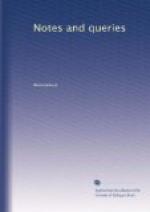of both universities, the bishop being ordinary, and
the archdeacon also of the place, where any such
shall be printed, or by two of them, whereof the
ordinary of the place to be always one. And that
the names of such, as shall allow the same, to be added
in the end of every such work, for a testimony
of the allowance thereof. And because many
pamphlets, plays, and ballads be oftentimes printed,
wherein regard would be had that nothing therein
should be either heretical, seditious, or unseemly
for Christian ears; Her Majesty likewise commandeth
that no manner of person shall enterprise to print
any such, except the same be to him licensed by
such Her Majesty’s commissioners, or three
of them, as be appointed in the city of London to
hear and determine divers clauses ecclesiastical, tending
to the execution of certain statutes made the
last parliament for uniformity of order in religion.
And if any shall sell or utter any manner of books
or papers, being not licensed as is abovesaid, that
the same party shall be punished by order of the
said commissioners, as to the quality of the fault
shall be thought meet. And touching all other
books of matters of religion, or policy, or governance,
that have been printed, either on this side the
seas, or on the other side, because the diversity
of them is great, and that there needeth good consideration
to be had of the particularities thereof, Her Majesty
referreth the prohibition or permission thereof
to the order, which her said commissioners within
the city of London shall take and notify. According
to the which, Her Majesty straitly chargeth and commandeth
all manner her subjects, and especially the wardens
and company of stationers, to be obedient.
“Provided that these orders do
not extend to any profane authors and works in
any language, that have been heretofore commonly received
or allowed in any of the universities or schools,
but the same may be printed, and used as by good
order they were accustomed.”—Cardswell’s
Documentary Annals, i. 229.
This injunction was, I take it, the origin of the
licensing of the press of this country. On the
23d June, 28 Eliz. 1586 (not 1585, as in Strype),
{426} Archbishop Whitgift and the Lords of the Privy
Council in the Star Chamber made rules and ordinances
for redressing abuses in printing. No printing-press
was to be allowed elsewhere than in London (except
one in each University); and no book was to be printed
until first seen and perused by the Archbishop of
Canterbury or Bishop of London; with an exception
in favour of the queen’s printer, and books of
the common law, which were to be allowed by the Chief
Justices and Chief Baron, or one of them. Extensive
and arbitrary powers of search for unlicensed books
and presses were also given to the wardens of the
Stationers’ Company. (Strype’s Life
of Archbishop Whitgift, 222.; Records, No.XXIV.)
On the 1st July, 1637, another decree of a similar
character was made by the Court of Star Chamber. (Rushworth’s




